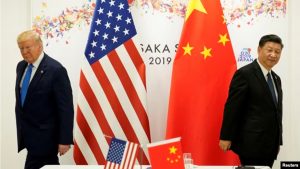
Meta Accused of Compromising U.S. National Security and Free Speech to Appease China, Whistleblower Testifies

In explosive testimony before the U.S. Senate on Wednesday, a former senior Facebook executive alleged that Meta Platforms Inc. compromised American national security and freedom of expression in efforts to expand its business ties with China.
Sarah Wynn-Williams, who served as Facebook’s global policy director, claimed that Meta CEO Mark Zuckerberg personally oversaw the development of a controversial content moderation tool that was deployed in Hong Kong and Taiwan, both politically sensitive regions for Beijing.
The system, according to Wynn-Williams, flagged Facebook posts that exceeded 10,000 views and routed them for approval to a so-called “chief editor.” This editor, she said, had the power to review, suppress, or even shut down content distribution in targeted areas — including China’s Xinjiang region or during politically sensitive events like the Tiananmen Square anniversary.
“One thing the Chinese Communist Party and Mark Zuckerberg share is that they want to silence their critics,” Wynn-Williams said during the hearing. “I can say that from personal experience.”
Meta Denies Allegations
Meta swiftly rejected the claims. Spokesperson Andy Stone told AFP the accusations were “detached from reality and full of false allegations,” adding, “Meta currently does not offer any services in China.”
While Meta’s platforms, including Facebook and Instagram, remain banned in mainland China, the company generates substantial advertising revenue from Chinese businesses targeting users abroad. Financial disclosures consistently list China as one of Meta’s top non-U.S. revenue sources.
Wynn-Williams also disclosed that Meta had once considered building a data center in China, which she warned could have endangered the personal data of American users. She further alleged that Meta briefed Chinese officials on its artificial intelligence technology.
Direct Engagement with Chinese Officials
According to Wynn-Williams, the “chief editor” was empowered to oversee viral content from Chinese-speaking regions and had received direct feedback from Chinese authorities, who tested the tool and requested optimizations.
“We must ensure you can block or filter images we don’t want people to see,” she quoted Chinese officials as saying.
She also asserted that Facebook had been engaged in content moderation related to China well before its platform was officially blocked there in 2009 — with direct discussions with Chinese authorities starting as early as 2014.
This timeline contradicts Zuckerberg’s 2018 congressional testimony, in which he told lawmakers the company could not fully understand Chinese content regulations because Facebook had been blocked since 2009. Wynn-Williams characterized that statement as “inaccurate.”
“This is a man who wears many different costumes,” she said. “We don’t know what the next costume’s going to be, but it’ll be something different. It’s whatever gets him closest to power.”
Shadow Bans and Political Censorship Alleged
Further concerns were echoed by Ethan Tu, founder of Taiwan AI Labs, which specializes in AI and information warfare. He claimed Facebook regularly suppressed content critical of China while allowing false narratives about the U.S. to remain.
“Posts celebrating Taiwan’s COVID success were censored, but Chinese-language misinformation about the U.S. stayed up,” Tu told Radio Free Asia.
He added that posts about sensitive subjects such as Huawei or cybersecurity often received “zero reach,” suggesting they were subject to shadow banning — an invisible form of suppression.
During the 2019 Hong Kong anti-extradition protests, Tu’s team observed a sudden disappearance of posts related to the movement.
“It seemed as if someone was deliberately censoring them,” he said.
Research by Taiwan AI Labs found that only 1.6% of content takedowns were tied to disinformation or hate speech. “The majority,” Tu said, “were linked to politically sensitive topics.”
Congressional Response and Investigations
In the wake of Wynn-Williams’ testimony, Senator Josh Hawley announced plans to investigate whether Meta had misled Congress in previous testimonies and said he would review internal documents provided by the whistleblower.
“This is just the beginning. We are going to get the truth,” Hawley said.
The hearing has reignited scrutiny over Big Tech’s relationship with authoritarian governments, and Meta in particular faces intensifying questions over its global content moderation practices and business dealings in politically sensitive markets.












Comments